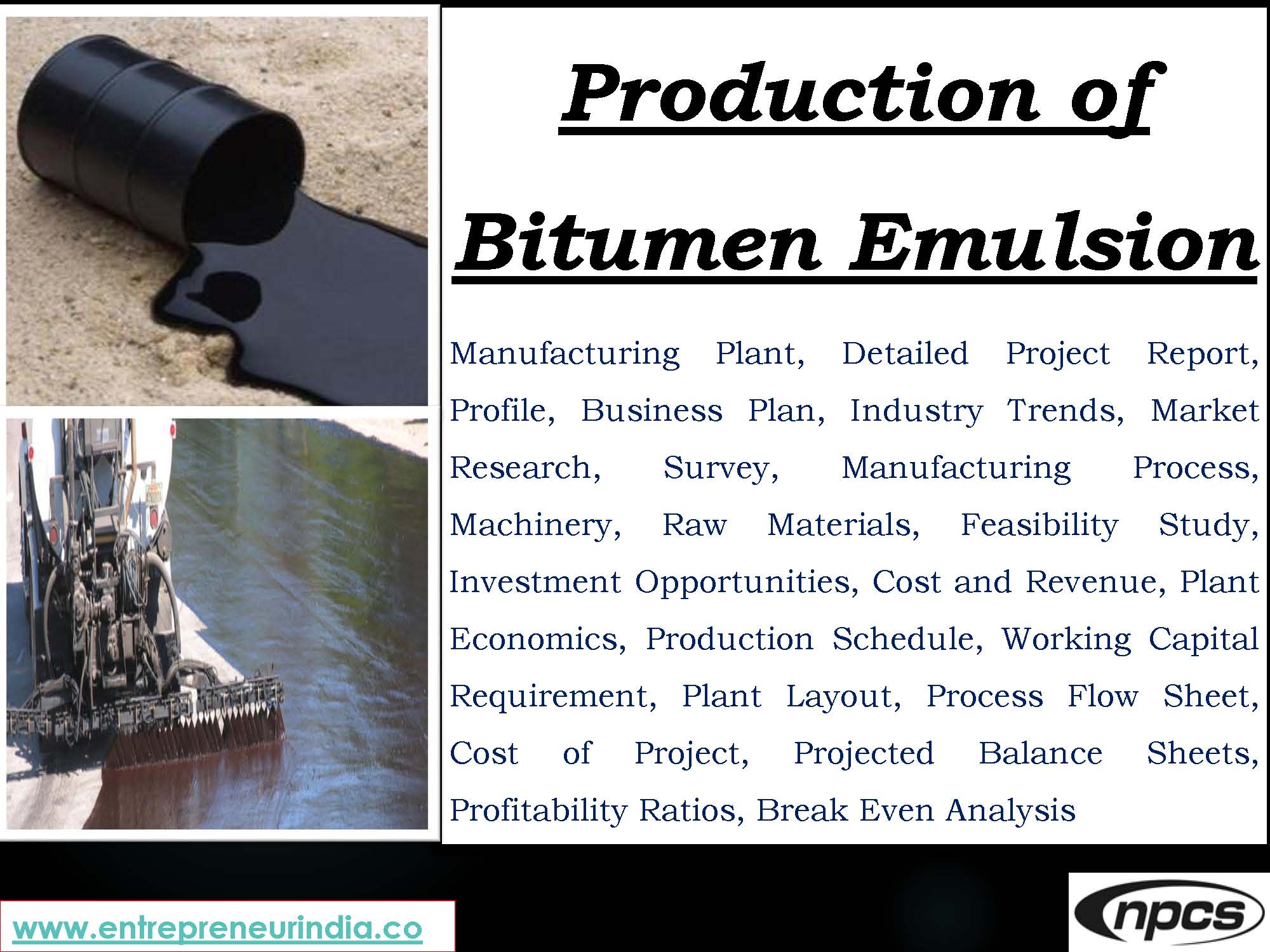
India’s growing road infrastructure demands modern, efficient, and eco-friendly construction materials. Among these, bitumen emulsion has become increasingly popular due to its cold application, reduced energy usage, and better bonding with aggregates. Used in road construction, surface dressing, pothole repairs, and tack coating, bitumen emulsions are revolutionizing the way roads are built and maintained. Moreover, with the government’s push on rural roads, national highways, and smart cities, setting up a bitumen emulsion manufacturing plant can be a highly profitable venture with assured market demand.
Bitumen Emulsion Manufacturing Plant | Project Report
Setting up a bitumen emulsion plant involves understanding raw materials, production processes, machinery, investment costs, and compliance norms. This detailed project report outlines all key aspects to help entrepreneurs plan, launch, and operate a successful emulsion production business.
See Also :Small-Scale Business
What Is Bitumen Emulsion?
Bitumen emulsion is a mixture of water, bitumen, and emulsifying agents. It exists in liquid form at room temperature, eliminating the need for heating, which is required in conventional bitumen applications. These emulsions are classified as:
-
Cationic Emulsions – Used in road construction for better adhesion
-
Anionic Emulsions – Less common but still in use in specific regions
Moreover, different types like RS (Rapid Setting), MS (Medium Setting), and SS (Slow Setting) emulsions are chosen based on application needs such as tack coat, patch repair, slurry seal, etc.
Raw Materials Required
To establish a bitumen emulsion manufacturing plant, you’ll need the following raw materials:
-
Bitumen (VG10 or VG30): The core ingredient
-
Water: Must be clean and soft for consistent emulsification
-
Emulsifier: Cationic (amine-based) or anionic, depending on product type
-
Acid (Hydrochloric or Acetic): For pH control
-
Additives: For storage stability and enhanced performance
Moreover, consistent supply of high-quality bitumen and emulsifiers is crucial for product performance and client satisfaction.
Manufacturing Process
The bitumen emulsion production process follows an advanced mechanical method using high-speed colloid mills. The steps include:
-
Pre-heating of bitumen to 60–70°C for easier emulsification
-
Mixing water with emulsifier, acid, and additives to create the aqueous phase
-
Blending both phases using a colloid mill at high speed
-
Cooling and storing in settling tanks or storage silos
Moreover, the process must maintain precise temperature and pH balance to avoid premature setting or separation of emulsion.
Plant Machinery and Equipment
Setting up a standard bitumen emulsion manufacturing plant requires the following equipment:
-
Colloid Mill (Core machinery for emulsification)
-
Bitumen and water tanks (with heating and stirring systems)
-
Emulsifier dosing system
-
Acid and additive dosing units
-
Pumps and piping systems (SS or coated steel for corrosion resistance)
-
Cooling and storage tanks
-
Electrical control panel and PLC system
Moreover, fully automated or semi-automated setups are available based on investment capacity.
Land and Infrastructure
A typical bitumen emulsion plant can be set up in an industrial area with 0.5 to 1 acre of land. Basic infrastructure includes:
-
Production shed and storage warehouse
-
Power supply and backup generator
-
Water treatment facility
-
Internal roads for tanker movement
-
Fire safety and pollution control systems
Moreover, proximity to bitumen depots and construction zones can reduce logistics cost.
Investment and Project Cost
The total investment in a bitumen emulsion plant depends on the capacity (in TPD – tons per day) and automation level. Here’s an estimated breakdown:
-
Land and building: ?25–35 lakhs (can be leased or owned)
-
Machinery and equipment: ?40–60 lakhs
-
Working capital: ?15–25 lakhs
-
Licenses and contingency: ?5–10 lakhs
Total estimated cost: ?85 lakhs to ?1.25 crore for a 10–15 TPD plant
Moreover, larger capacities or export-oriented units may require higher investments.
Profitability and ROI
With consistent demand from PWD contractors, highway developers, and municipal corporations, the bitumen emulsion business is profitable. Revenue and profits can be estimated as:
-
Per-ton production cost: ?12,000–?13,000
-
Per-ton selling price: ?15,000–?18,000 (depending on quality and location)
-
Monthly turnover (10 TPD, 25 working days): ?37–45 lakhs
-
Monthly profit margin: ?4–7 lakhs (after expenses)
Moreover, ROI can be achieved in 18–24 months with effective marketing and production efficiency.
Licenses and Compliance
You’ll need the following registrations and approvals:
-
Factory license from State Industrial Department
-
MSME/Udyam Registration
-
GST Registration
-
Pollution clearance (Consent to Establish & Operate) from State Pollution Control Board
-
Fire safety NOC
-
Labour and ESI registrations (if hiring >10 workers)
Moreover, ensure that your product conforms to Indian Road Congress (IRC) and Ministry of Road Transport and Highways (MoRTH) specifications.
Market Demand and Clients
The primary clients for bitumen emulsion include:
-
Road construction contractors (NH, PMGSY, state highways)
-
Municipal corporations for pothole repair and urban roads
-
Infra companies like L&T, NCC, and IRB
-
Ready-mix emulsion packers
-
Export buyers in Nepal, Bangladesh, and African nations
Moreover, consistent quality, on-time delivery, and flexible packaging (bulk or drums) can give you a competitive edge.
Sustainability and Future Scope
The future of the bitumen emulsion industry looks promising due to:
-
Shift toward cold mix technologies
-
Environmental concerns over hot mix methods
-
Government push for green and energy-efficient road solutions
-
Innovation in polymer-modified emulsions and micro surfacing
Moreover, training your team in quality control and maintenance ensures long-term sustainability of operations.
Read Also :Notebook Manufacturing
Conclusion
Setting up a bitumen emulsion manufacturing plant is a smart industrial venture, especially in India’s infrastructure-driven economy. With relatively moderate investment, strong demand, and future-ready technology, the business offers solid returns and growth potential. Moreover, adopting the right machinery, sourcing quality raw materials, and adhering to regulatory norms are key to success in this industry. If you’re looking to enter a core industrial sector with continuous demand and limited competition, this is one of the best manufacturing businesses to consider.





